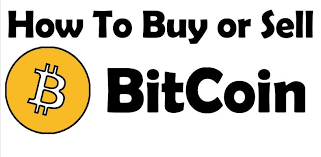How to Buy Or Sell Bitcoin? Now know!
Selling bitcoin online is by far the more common way of trading your bitcoin. There are now three ways to go about selling bitcoin online.
The first way involves a direct trade with another person, an intermediary facilitating the connection.
The second way is through an online exchange, where your trade is with the exchange rather than another individual.
New peer-to-peer trading marketplaces that allow bitcoin owners to obtain discounted goods with their bitcoin via others that want to obtain the cryptocurrency with credit/debit cards. The two groups are brought together to solve both problems in a kind of peer-to-peer exchange.
Direct trades: Websites that offer this type of selling structure include Coinbase and LocalBitcoins in the US, and BitBargain UK and Bittylicious in the UK.
On these sites, you will usually have to register as a seller. This involves verifying your identity, which we will discuss again later. Once you have registered, you can post an offer, signalling that you want to sell, and the website will alert you when a buyer wants to trade with you. From there, your interaction is solely with the buyer, but you use the website to complete your trade.
The process of selling on Bitbargain UK and (more so) Bittylicious can be quite involved and requires some patience. However, support at the former site has been great in our experience. Bitcoin users with bank accounts in the United States should consider using Coinbase or Circle, which have both won many fans with their simplicity.
- Exchange trades: The other way to sell bitcoins is to register with an online exchange. You will still have to verify your identity, but in this case you won’t have to do as much work when it comes to organizing the sale.
Exchanges act as an intermediary who holds everyone's funds. You place a ‘sell order’ (just as you would place a buy order), stating the volume (amount) and type of currency you wish to sell (eg bitcoin), and the price per unit you wish to sell for.
As soon as someone places a matching buy order, the exchange will complete the transaction. The currency will then be credited to your account.
The downside that accompanies this ease of use is that, if you are selling bitcoin for fiat currencies, you will need to withdraw those funds to your bank. If the exchange is facing liquidity problems or issues with its banks, it can take an inordinate amount of time to receive your funds.
Mt. Gox became infamous for this problem before it went bankrupt, and BTC-e has recently been plagued with reports of similar difficulties. Therefore, you should carefully research the exchange you intend to use before committing funds.
Examples of other crypto-to-fiat currency exchanges include Circle, Kraken and Bitstamp.
Alternatively, you could use a pure cryptocurrency exchange to change bitcoin for another cryptocurrency. It's less likely that anyone would want to do this, but there are reasons such as arbitrage, or the rare occasion if a shop accepts something other than bitcoin (for example, Bitcoin Shop now accepts litecoin and dogeoin too, for a wide range of goods).
Examples of these types of sites are: BTER, CoinCorner and Cryptsy.
In addition, you’ll have to pay a fee to use some exchanges. BTC-e charges a flat 0.2%. For overviews of what fees are charged by the various cyrptocurrency markets and what volumes are being traded, see CoinCompare and Bitcoin Charts for up-to-date information.
Another consideration is that there will be some limit to the amount of money you are allowed to store (subject to change over time) on an exchange. Regardless, it is not wise to use exchanges to store your entire pot of coins, even though it can appear to be the easy option if all you are doing is speculating.
You should take responsibility for your own funds, and store any unneeded amounts on your own devices or offline, rather than trusting an exchange that might one day be hacked.
- Peer-to-peer trading marketplaces
A new development in the bitcoin space is the advent of sites like Brawker and Purse, which set out to bring together two groups of people with specific and complementary needs.
The first group are individuals who want to be able to use bitcoin to buy goods from sites which do not yet directly accept digital currencies. The second comprises of others who would like to buy bitcoin with a credit or debit card. The marketplace brings together individuals with matching requirements to effectively sell bitcoin to one and provide discounted goods for the other.
The marketplace acts as an intermediary, offering users the platform, bitcoin wallet and escrow for transactions.
How it works:
Alice posts her required Amazon wish list on the marketplace, stating the discount she would like (normally up to 25%).
Bob has a credit/debit card and wants to buy bitcoin matching the value of Alice's purchase(s). He accepts the trade and, through the marketplace, buys the Amazon goods and requests they be delivered to Alice's address.
Once the goods are delivered, Alice notifies the marketplace and Bob's bitcoin are released from escrow and arrive in his wallet, minus Alice's agreed discount and a small fee for the marketplace.
This system does mean that Bob will be paying a relatively high fee for the service, but also means he will be easily able to acquire bitcoin via bank card.

plese polo mi
Congratulations @abhridoy! You have completed some achievement on Steemit and have been rewarded with new badge(s) :
Click on any badge to view your own Board of Honor on SteemitBoard.
For more information about SteemitBoard, click here
If you no longer want to receive notifications, reply to this comment with the word
STOP